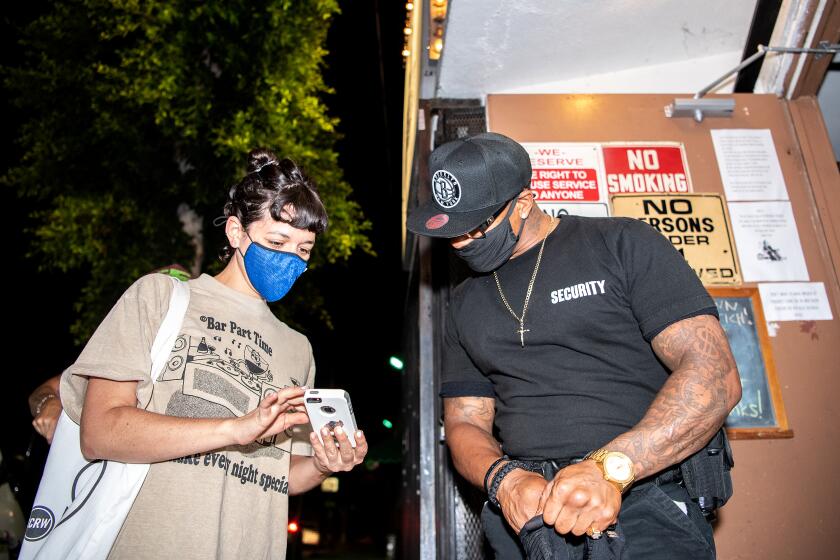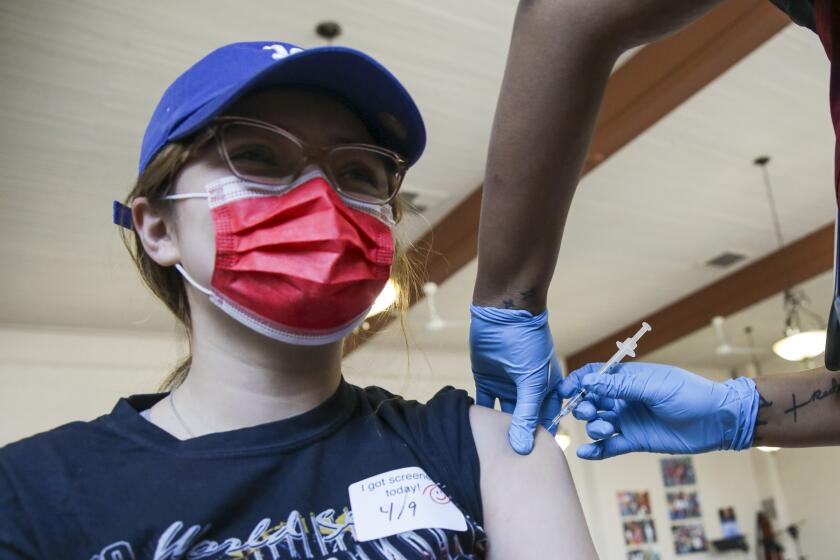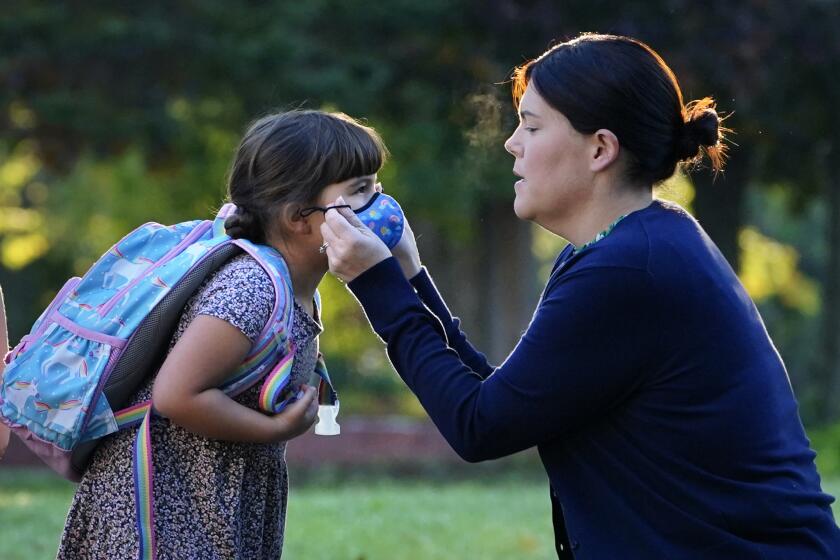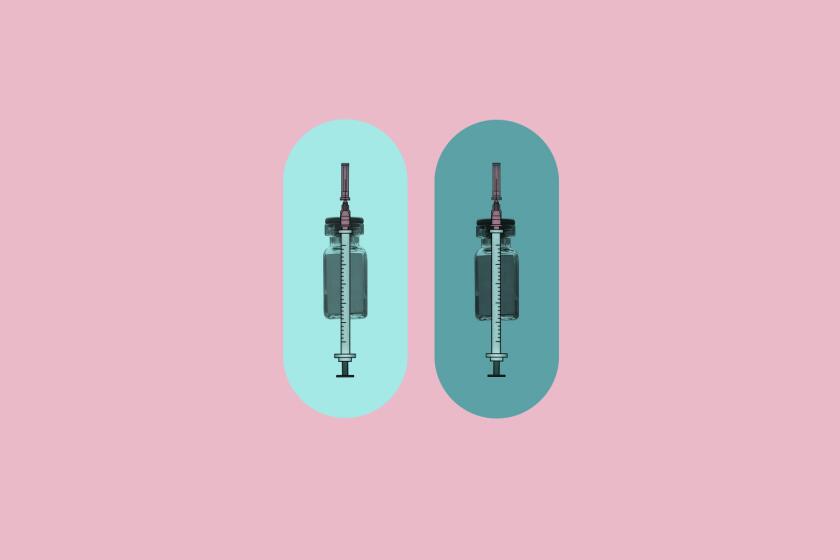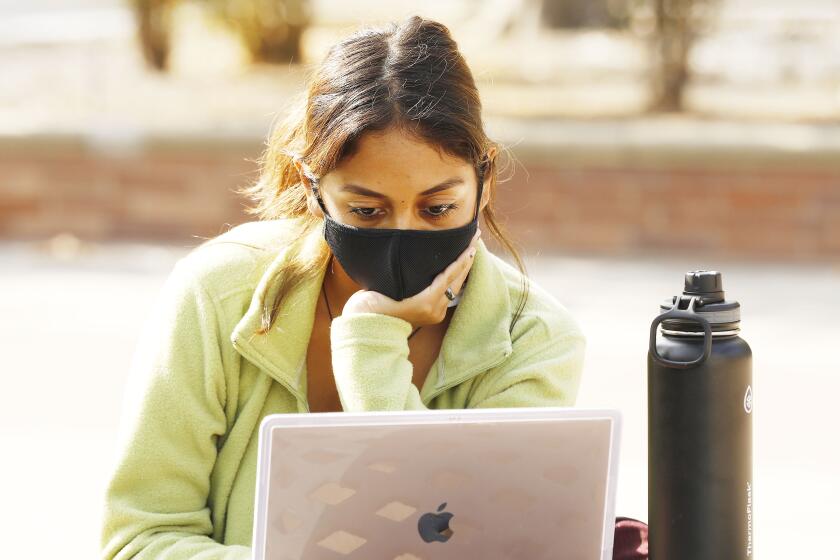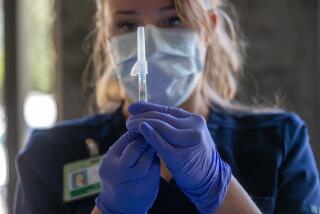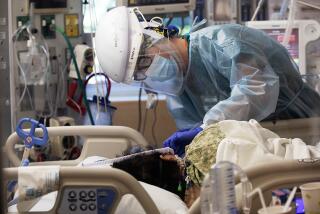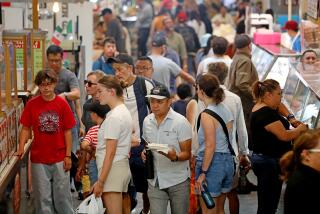In coronavirus milestone, San Francisco set to lift some indoor mask rules
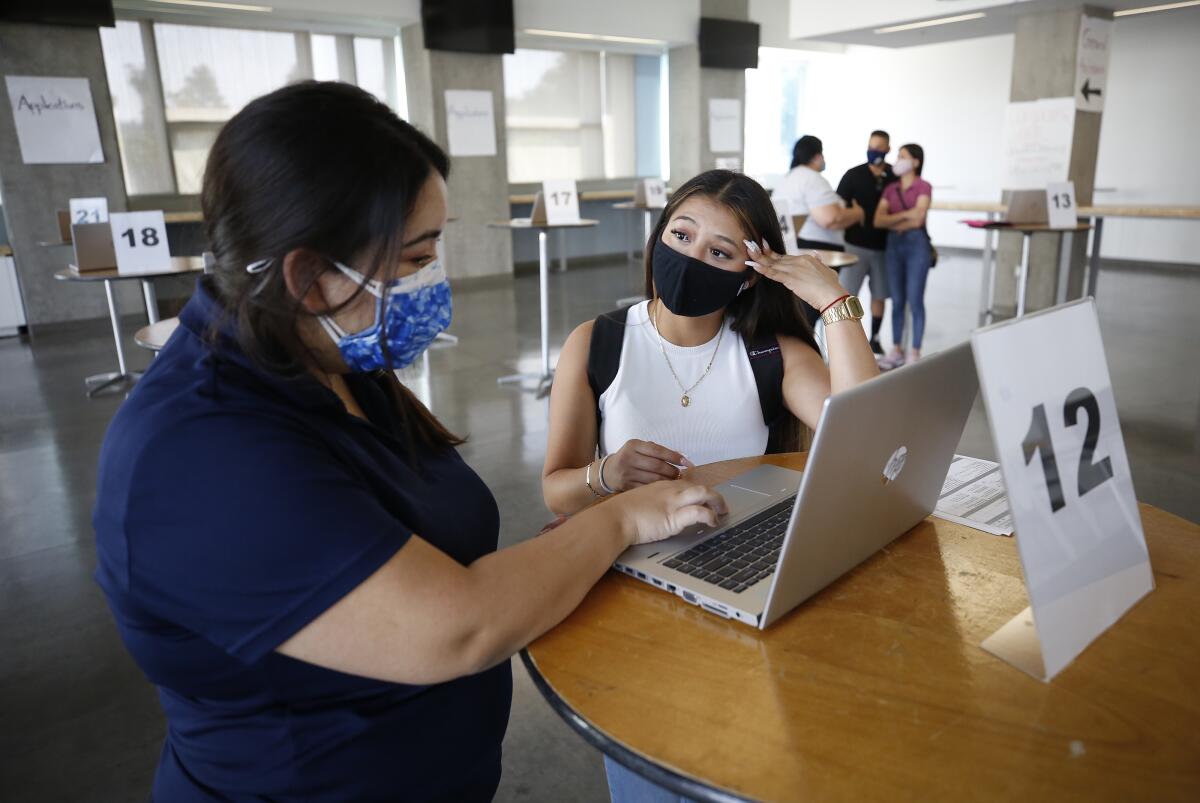
In a sign of improving COVID-19 conditions, San Francisco is set to lift mask requirements in indoor gyms and offices next week — but only if everyone inside is vaccinated.
The move would make San Francisco the first slice of the Bay Area to significantly relax the public indoor face covering requirements imposed in midsummer in response to the recent Delta surge. If recent trends continue, it won’t be the last.
As long as the numbers of newly confirmed infections and patients being admitted to hospitals remain stable and low, San Francisco will lift indoor masking requirements on Oct. 15, not only in offices and gyms, but also in indoor college classrooms, places of worship, employee commuter vehicles and other gatherings of people who meet regularly but don’t exceed 100 people. Everyone inside those places must be vaccinated.
Employers or hosts must ensure that rooms are properly ventilated, children under 12 and guests are not present, and there have been no recent COVID-19 outbreaks.
The vaccine verification requirement went into effect at 11:59 p.m. Thursday.
Berkeley and San Francisco are the only two Bay Area jurisdictions that require customers 12 and older in indoor restaurants, bars and gyms to show proof of a COVID-19 vaccination. Contra Costa County, the Bay Area’s third-most populous, has ordered those customers to show either proof of vaccination or a recent negative coronavirus test result.
San Francisco Mayor London Breed — who last month was criticized for shedding her mask at an indoor jazz nightclub, despite the mask order — characterized the move as “an important step forward,” especially for the downtown area.
“When I talk to office workers and business leaders, one of the things I continue to hear is that they’re anxious to get back to a more normal routine at work where they can interact with their colleagues,” she said in a statement. “Our economy is bouncing back, the city feels like it is coming alive again, and this is yet another milestone in our recovery.”
Indoor masking requirements will remain in force in settings that are more widely accessible, including stores, shopping malls and restaurants and bars except when drinking and eating.
Health officials say a coronavirus infection does provide some immunity, but it doesn’t last long enough, given how the pandemic is going.
San Francisco’s announcement comes on the same day most counties in the Bay Area unveiled the criteria that they agree must be met to broadly lift mask requirements in indoor public spaces. But it could be months before counties meet those self-set benchmarks.
These jurisdictions — San Francisco, Alameda, Contra Costa, Marin, Napa, San Mateo, Santa Clara and Sonoma counties — say they’ll retire the local indoor mask mandate when they achieve all of the following:
- They’ve been in the U.S. Centers for Disease Control and Prevention’s “moderate,” or yellow, transmission tier for at least three weeks;
- The local health officer determines COVID-19 hospitalizations are sufficiently stable and low;
- At least 80% of the total population is fully vaccinated, or eight weeks have passed since the shots were authorized for use in children between the ages of 5 and 11.
No county in the Bay Area has achieved all of these thresholds. In fact, as of Thursday, every county reporting data to the CDC in California was in one of the CDC’s agency’s worst two tiers in rating coronavirus transmission levels: “substantial” or orange, and “high” or red.
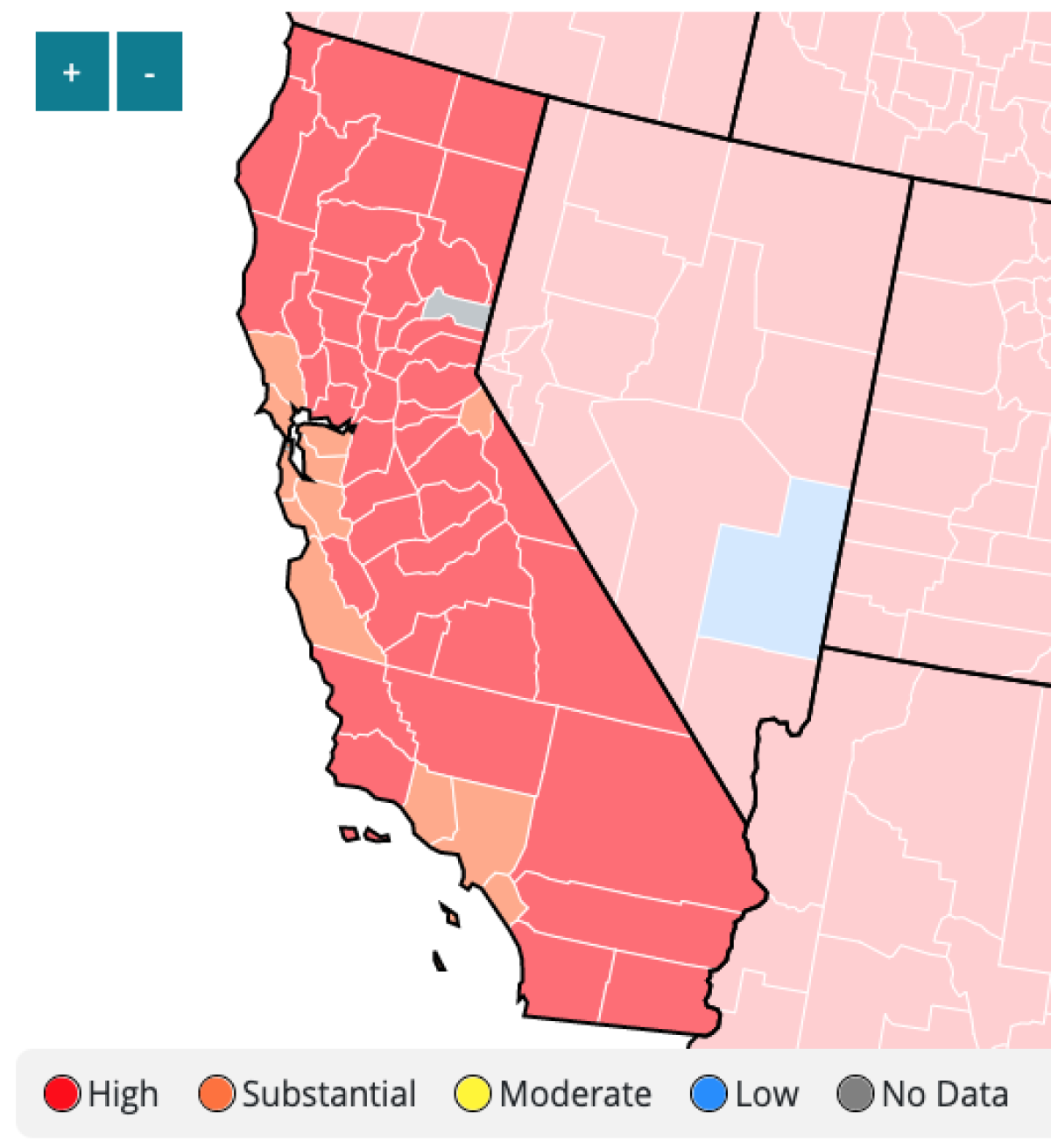
San Francisco estimates that 75% of residents of all ages are fully vaccinated; Santa Clara County, the Bay Area’s most populous, reports 72% of all residents are fully vaccinated. In Contra Costa County, 71% of all residents are fully vaccinated.
Hitting all three thresholds to lift the indoor mask mandate may not be reached in Contra Costa County until the end of this year or the start of next year, officials there said in a statement.
Bay Area counties may decide on their own to lift mask mandates at different times, Dr. Sara Cody, the Santa Clara County public health director and health officer, said at a briefing. That might lead to a scenario in which one county might still require masks while its neighbors do not.
“The most important thing is that we have metrics that are relatively simple and that the public can see, and that we can track them together,” Cody said.
Pfizer formally applies to the FDA for use of its COVID-19 vaccine in children ages 5 to 11. If regulators agree, shots could begin within weeks.
Health officials have long said curtailing the coronavirus takes a multipronged approach. Actions such as wearing masks in public, observing physical distancing and getting vaccinated can all reduce a person’s risk of being infected — but they’re more effective when used together.
“Essentially, we want to ensure that we have many layers of prevention. We want to make sure that the vaccination layer is really robust before we peel back the masking layer,” Cody said.
Currently, children younger than 12 are not eligible to be inoculated. Pfizer has asked for federal approval to use its COVID-19 immunizations in children ages 5 to 11, but it may take until Thanksgiving before those immunizations are authorized.
Much of the Bay Area has regularly moved in concert throughout the pandemic — adding and lifting restrictions together to present a unified front against the coronavirus.
Masks were no exception. Health officers from most Bay Area counties jointly announced their existing mandates in early August, when the Delta variant was still storming across the region. (Solano County never re-implemented a mask mandate, and a county adjacent to the Bay Area, Santa Cruz, enacted a mask mandate weeks later than the rest of the Bay Area, and lifted its mask order last week.)
Health officials say it’s OK to get your COVID-19 vaccine and flu vaccine at the same time.
While other counties across the state adopted similar rules, California as a whole never reimposed a universal indoor mask mandate during the latest wave. While state health officials require unvaccinated residents to wear masks in indoor public places, they still only recommend vaccinated individuals do likewise.
Bay Area officials said the path unveiled Thursday will provide clarity to the public and allow residents to easily track how close their county or city is to clearing all the hurdles.
“Masks and vaccines together have protected residents of Alameda County and the Bay Area during the summer wave,” Dr. Nicholas Moss, the Alameda County health officer, said in a statement. “While we expect COVID-19 and flu to circulate this winter, with more people well-protected from severe illness by vaccination, we will be able to loosen mask requirements safely.”
The easing of local indoor mask requirements will not affect mask requirements imposed by the state or federal governments. The state, for instance, has ordered indoor mask use in K-12 school settings, and the federal government has ordered indoor mask use on public transportation, such as airplanes, trains and buses and at airports.
COVID-19 hospitalizations have dropped by half from the summer peak, as California continues to steadily shake off the worst of the Delta surge.
When asked about the Bay Area announcement, Los Angeles County Public Health Director Barbara Ferrer said, “We’re obviously looking at doing something similar.”
“I don’t know that it will mimic what’s happening up in the Bay Area communities. They already have, for example, much higher vaccination rates overall than we do,” she told reporters Thursday. “And their community demographics obviously look different.”
Ferrer said that 60% of L.A. County residents of all ages are fully vaccinated. According to the CDC, L.A. County has a higher degree of social vulnerability to natural disasters such as pandemics based on a number of factors, including poverty and crowded housing, compared with the Bay Area.
Los Angeles County was the first county in California to reinstitute a mandatory mask mandate in indoor settings. The move, ordered in mid-July, was credited by experts for blunting the effects of the Delta surge.
Ferrer did say that L.A. County’s approach in easing the mask requirement would probably “be linked to risk at certain settings. So, as I’ve said before, if you have a lot of unvaccinated students, like we do at our elementary schools, that masking requirement is really the primary mode of protection. So I don’t see that going away in a school setting until we have more people able to be vaccinated.”
“We’ve been very honest from the beginning that one of the driving forces here will be getting back to lower community rates of transmission,” Ferrer said.
Other counties in Southern California that issued indoor mask mandates in response to the summer Delta surge include Ventura, Santa Barbara, San Luis Obispo and Imperial.
More to Read
Sign up for Essential California
The most important California stories and recommendations in your inbox every morning.
You may occasionally receive promotional content from the Los Angeles Times.
